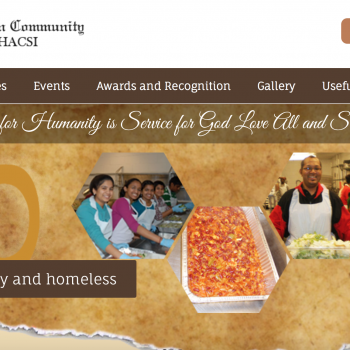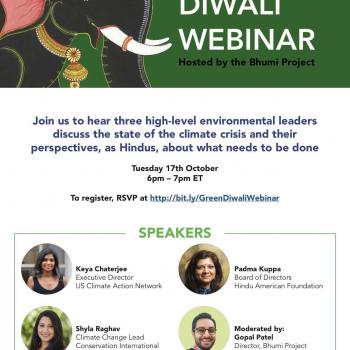Editors’ Note: This article is part of the Patheos Public Square on Charitable Giving. Read other perspectives here.
In years past, the December dilemma was usually delayed to January, when my children went back to school after the winter holiday break, because of the commercialization of the holiday and listening to their classmates enumerate the gifts they had gotten for Christmas. Because of our pluralistic Hindu approach, the December season was more about making and giving Christmas cookies, and enjoying time with friends and family celebrating the holy day (including attending Midnight Mass), rather than the giving and receiving of gifts. As they have grown, our focus has been on the charitable giving that happens during the season, and on the year-round Hindu ideal of seva, that requires selflessness, instead of an exchange of gifts – even while enjoying gift-giving as an act of love and appreciation.
The kind of gift giving that happens at Christmas is not common to the practice of Hinduism. The four-fold pursuit of dharma-artha-kama-moksha is key to a Hindu’s spiritual life; from this stems the concept of serving (and giving) to others. Dr. D.C. Rao, Hindu representative to the Interfaith Conference of Metropolitan Washington [D.C.] and recipient of the Hindu American Foundation’s 2014 Dharma Seva Award, explains the steps in a Hindu’s spiritual journey, thus:
The first step is to discipline the desire for material possessions [artha] and sense pleasures [kama]. This is done by firm adherence to dharma, the ethical foundation that is elaborately explained in Hindu scriptures. By performing one’s duty and cultivating qualities such as honesty, self-discipline, love and compassion, the mind becomes less agitated by base emotions such as greed, anger and lust. The second step in the Hindu spiritual journey is dedication to selfless service, undertaking all actions without focus on personal gain. This is known as karmayoga. Practice of karma yoga softens the personal ego by discovering the joy to be found in serving others and working as an instrument of God.
The Hindu scriptures abound with instructions and stories of how important seva and daanam (selfless service and charitable giving, respectively) are. In the Bhagavad Gita, in Chapter 16, verses 1-3 of the conversation between Arjuna and Sri Krishna, charity is one of the 26 essential characteristics of a pious person or one with divine tendencies:
Bhagavån Sri Krishna said: O Bhårata, these are the various qualities of one who is born with a divine nature (deva) – fearlessness, pure-heartedness, absorption in spiritual knowledge, charity, self-control, sacrifice, study of the Vedas, austerity, sincerity, nonviolence, truthfulness, freedom from anger, renunciation, serenity, aversion to finding faults in others, compassion for all creatures, absence of avarice, gentleness, modesty, steadiness, valor, forgiveness, patience, cleanliness, freedom from envy and the desire for prestige.
The much-loved and referred-to Gita, which has at least another 20 references to the importance of daanam, speaks of three types of giving in chapter 17, verses 20-22:
- A gift that is given without any expectation of appreciation or reward is beneficial to both giver and recipient.
- A gift that is given reluctantly and with the expectation of some advantage is harmful to both giver and recipient.
- A gift that is given without any regard for the feelings of the recipient and at the wrong time, so causing embarrassment to the recipient, is again harmful to both giver and recipient.
The much-chanted hymn, the Vishnu Sahasra Naama, delineates that “help, support, charity, gifts, protection or rescue, are all the virtues which embody godliness.” Often-told stories in the Ramayana and Mahabharata illustrate the importance of charitable giving, and especially how anonymity is of critical importance. Specific sampradaya and religious organizations, such as the Saiva Siddhanta Church in Hawaii, encourage devotees to donate a portion of their income. Satguru Sivaya Subramuniyaswami, elucidating on the concept of Karma, said this: “Giving is an investment in the future; it is not parting with something.”
Another learned guru, the Divine Life Society’s Swami Krishnananda, expounded on a verse from the Brihadaranyaka Upanishad: Trayāḥ prājāpatyāḥ prājapatau pitari brahma-caryam ūṣuḥ, devā manuṣyā asurāḥ, uṣitvā brahmacaryaṁ devā ūcuh; bravītu no bhavān iti.
On one occasion the gods, the human beings and the demons all observed self-restraint, Brahmacharya, Tapasya and austerity for the sake of gaining knowledge from the Creator. Having observed great austerity they went to Brahma, the Creator Himself, and said, “Give us instruction.” Who went? Three groups. One group of the celestials, the gods, denizens of Indra-loka, paradise, who enjoy all sorts of pleasures, second the men of this earth plane, and third the demons, extremely cruel in their nature. To the gods he said, “I give you instruction. Listen! Da.” He said but one word, “Da”. “Do you understand what I say?” “Yes, we understand.” “Very good! So, follow this instruction.” Then he looked to the human beings, “Do you want instruction from me?” “Yes!” “Da,” he said again. “Do you follow what I say?” “Yes, we understand.” “Very good! Now go and follow this instruction.” Then the demons were called and he said “Da” to the demons also, and the demons, like the others said, “Yes, we have understood what it is.” “Go and follow this instruction.” To all the three he told the same thing, but the meaning was taken differently by the different groups. “Da, Da, Da,” he said. That is all he spoke.
The celestials…are fond of enjoyment. There is no old age there… no sweating, no toiling, no hunger, no thirst, no drowsiness and nothing untoward as in this world… So the instruction to those people was Da-‘Dāmyata’. In Sanskrit Dāmyata means, restrain yourself. Dāmyata comes from the word Dam, to restrain. Subdue your senses. Do not go too much in the direction of the enjoyment of the senses. That was ‘Da’ to the celestials. Kama is to be controlled by self-restraint.
Human beings are greedy. They want to grab everything. Hoarding is their basic nature. “I want a lot of money”; “I have got a lot of land and property”; “I want to keep it with myself”; “I do not want to give anything to anybody”. So, to them ‘Da’ meant Datta – ‘give in charity’. Do not keep with you more than what you need. Do not take what you have not given. Do not appropriate what does not belong to you. All these are implied in the statement – be charitable. Charitable not only in material giving but also in disposition, in feeling, in understanding and in feeling the feelings of others. So, to the human beings this was the instruction – Datta, give, because they are not prepared to give. Greed is to be controlled by charity.
And to the demons, who are very cruel, who always insult, injure and harm other people ‘Da’ meant Dayadhvam – be merciful to others. The third ‘Da’ means Dayadhvam – be merciful. Do not be cruel and hard-hearted. Demons are hard-hearted… Anger is to be controlled by mercy…All instructions were conveyed by a single word only; a single letter, but the meaning was conveyed properly to the individual groups concerned… If this instruction can be followed in its spirit, then the desire, greed and anger of the personality can be sublimated by self-restraint, charity and mercy respectively.
Just as the Da-Da-Da in his narration of the story is supposed to remind us of thunder, his words remind people to give up our greed and be charitable.
Interestingly, this story of Prajapathi and the importance of self control, compassion, and charity found its way into my life not through scripture but though the poetry of T. S. Eliot. In the final words of last section of his epic poem, The Wasteland, Eliot draws on this Hindu story about “What the Thunder Said” to remind us that it is “Datta, Dayadhvam, Damyata” that will lead us to “Shantih, shantih, shantih.” Eliot’s work – and that of many others, as explained in American Veda by Phil Goldberg – was influenced by Hinduism. Eliot’s words bring me full circle: while I am an American, working within the constraints of the American tax code and Western capitalism and consumerism, I also draw from my Hindu roots, and the ideals of charity and selfless giving. Whether it is through scripture from the East, or poetry from the West that draws upon Hinduism’s timeless philosophy, the message is clear: charitable giving is needed as an essential component in one’s search for peace.














